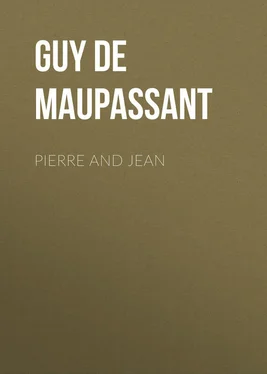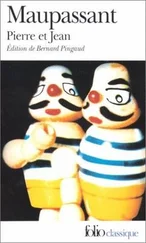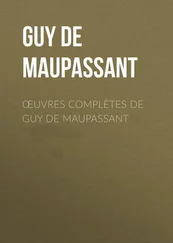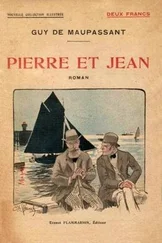Guy Maupassant - Pierre and Jean
Здесь есть возможность читать онлайн «Guy Maupassant - Pierre and Jean» — ознакомительный отрывок электронной книги совершенно бесплатно, а после прочтения отрывка купить полную версию. В некоторых случаях можно слушать аудио, скачать через торрент в формате fb2 и присутствует краткое содержание. Жанр: literature_19, foreign_antique, foreign_prose, на английском языке. Описание произведения, (предисловие) а так же отзывы посетителей доступны на портале библиотеки ЛибКат.
- Название:Pierre and Jean
- Автор:
- Жанр:
- Год:неизвестен
- ISBN:нет данных
- Рейтинг книги:5 / 5. Голосов: 1
-
Избранное:Добавить в избранное
- Отзывы:
-
Ваша оценка:
- 100
- 1
- 2
- 3
- 4
- 5
Pierre and Jean: краткое содержание, описание и аннотация
Предлагаем к чтению аннотацию, описание, краткое содержание или предисловие (зависит от того, что написал сам автор книги «Pierre and Jean»). Если вы не нашли необходимую информацию о книге — напишите в комментариях, мы постараемся отыскать её.
Pierre and Jean — читать онлайн ознакомительный отрывок
Ниже представлен текст книги, разбитый по страницам. Система сохранения места последней прочитанной страницы, позволяет с удобством читать онлайн бесплатно книгу «Pierre and Jean», без необходимости каждый раз заново искать на чём Вы остановились. Поставьте закладку, и сможете в любой момент перейти на страницу, на которой закончили чтение.
Интервал:
Закладка:
Guy de Maupassant
Pierre and Jean
CHAPTER I
“Tschah!” exclaimed old Roland suddenly, after he had remained motionless for a quarter of an hour, his eyes fixed on the water, while now and again he very slightly lifted his line sunk in the sea.
Mme. Roland, dozing in the stern by the side of Mme. Rosemilly, who had been invited to join the fishing-party, woke up, and turning her head to look at her husband, said:
“Well, well! Gerome.”
And the old fellow replied in a fury:
“They do not bite at all. I have taken nothing since noon. Only men should ever go fishing. Women always delay the start till it is too late.”
His two sons, Pierre and Jean, who each held a line twisted round his forefinger, one to port and one to starboard, both began to laugh, and Jean remarked:
“You are not very polite to our guest, father.”
M. Roland was abashed, and apologized.
“I beg your pardon, Mme. Rosemilly, but that is just like me. I invite ladies because I like to be with them, and then, as soon as I feel the water beneath me, I think of nothing but the fish.”
Mme. Roland was now quite awake, and gazing with a softened look at the wide horizon of cliff and sea.
“You have had good sport, all the same,” she murmured.
But her husband shook his head in denial, though at the same time he glanced complacently at the basket where the fish caught by the three men were still breathing spasmodically, with a low rustle of clammy scales and struggling fins, and dull, ineffectual efforts, gasping in the fatal air. Old Roland took the basket between his knees and tilted it up, making the silver heap of creatures slide to the edge that he might see those lying at the bottom, and their death-throes became more convulsive, while the strong smell of their bodies, a wholesome reek of brine, came up from the full depths of the creel. The old fisherman sniffed it eagerly, as we smell at roses, and exclaimed:
“Cristi! But they are fresh enough!” and he went on: “How many did you pull out, doctor?”
His eldest son, Pierre, a man of thirty, with black whiskers trimmed square like a lawyer’s, his mustache and beard shaved away, replied:
“Oh, not many; three or four.”
The father turned to the younger. “And you, Jean?” said he.
Jean, a tall fellow, much younger than his brother, fair, with a full beard, smiled and murmured:
“Much the same as Pierre – four or five.”
Every time they told the same fib, which delighted father Roland. He had hitched his line round a row-lock, and folding his arms he announced:
“I will never again try to fish after noon. After ten in the morning it is all over. The lazy brutes will not bite; they are taking their siesta in the sun.” And he looked round at the sea on all sides, with the satisfied air of a proprietor.
He was a retired jeweller who had been led by an inordinate love of seafaring and fishing to fly from the shop as soon as he had made enough money to live in modest comfort on the interest of his savings. He retired to le Havre, bought a boat, and became an amateur skipper. His two sons, Pierre and Jean, had remained at Paris to continue their studies, and came for the holidays from time to time to share their father’s amusements.
On leaving school, Pierre, the elder, five years older than Jean, had felt a vocation to various professions and had tried half a dozen in succession, but, soon disgusted with each in turn, he started afresh with new hopes. Medicine had been his last fancy, and he had set to work with so much ardour that he had just qualified after an unusually short course of study, by a special remission of time from the minister. He was enthusiastic, intelligent, fickle, but obstinate, full of Utopias and philosophical notions.
Jean, who was as fair as his brother was dark, as deliberate as his brother was vehement, as gentle as his brother was unforgiving, had quietly gone through his studies for the law and had just taken his diploma as a licentiate, at the time when Pierre had taken his in medicine. So they were now having a little rest at home, and both looked forward to settling in Havre if they could find a satisfactory opening.
But a vague jealousy, one of those dormant jealousies which grow up between brothers or sisters and slowly ripen till they burst, on the occasion of a marriage perhaps, or of some good fortune happening to one of them, kept them on the alert in a sort of brotherly and non-aggressive animosity. They were fond of each other, it is true, but they watched each other. Pierre, five years old when Jean was born, had looked with the eyes of a little petted animal at that other little animal which had suddenly come to lie in his father’s and mother’s arms and to be loved and fondled by them. Jean, from his birth, had always been a pattern of sweetness, gentleness, and good temper, and Pierre had by degrees begun to chafe at ever-lastingly hearing the praises of this great lad, whose sweetness in his eyes was indolence, whose gentleness was stupidity, and whose kindliness was blindness. His parents, whose dream for their sons was some respectable and undistinguished calling, blamed him for so often changing his mind, for his fits of enthusiasm, his abortive beginnings, and all his ineffectual impulses towards generous ideas and the liberal professions.
Since he had grown to manhood they no longer said in so many words: “Look at Jean and follow his example,” but every time he heard them say “Jean did this – Jean does that,” he understood their meaning and the hint the words conveyed.
Their mother, an orderly person, a thrifty and rather sentimental woman of the middle class, with the soul of a soft-hearted book-keeper, was constantly quenching the little rivalries between her two big sons to which the petty events of their life constantly gave rise. Another little circumstance, too, just now disturbed her peace of mind, and she was in fear of some complications; for in the course of the winter, while her boys were finishing their studies, each in his own line, she had made the acquaintance of a neighbour, Mme. Rosemilly, the widow of a captain of a merchantman who had died at sea two years before. The young widow – quite young, only three-and-twenty – a woman of strong intellect who knew life by instinct as the free animals do, as though she had seen, gone through, understood, and weighted every conceivable contingency, and judged them with a wholesome, strict, and benevolent mind, had fallen into the habit of calling to work or chat for an hour in the evening with these friendly neighbours, who would give her a cup of tea.
Father Roland, always goaded on by his seafaring craze, would question their new friend about the departed captain; and she would talk of him, and his voyages, and his old-world tales, without hesitation, like a resigned and reasonable woman who loves life and respects death.
The two sons on their return, finding the pretty widow quite at home in the house, forthwith began to court her, less from any wish to charm her than from the desire to cut each other out.
Their mother, being practical and prudent, sincerely hoped that one of them might win the young widow, for she was rich; but then she would have liked that the other should not be grieved.
Mme. Rosemilly was fair, with blue eyes, a mass of light waving hair, fluttering at the least breath of wind, and an alert, daring, pugnacious little way with her, which did not in the least answer to the sober method of her mind.
She already seemed to like Jean best, attracted, no doubt, by an affinity of nature. This preference, however, she betrayed only by an almost imperceptible difference of voice and look and also by occasionally asking his opinion. She seemed to guess that Jean’s views would support her own, while those of Pierre must inevitably be different. When she spoke of the doctor’s ideas on politics, art, philosophy, or morals, she would sometimes say: “Your crotchets.” Then he would look at her with the cold gleam of an accuser drawing up an indictment against women – all women, poor weak things.
Читать дальшеИнтервал:
Закладка:
Похожие книги на «Pierre and Jean»
Представляем Вашему вниманию похожие книги на «Pierre and Jean» списком для выбора. Мы отобрали схожую по названию и смыслу литературу в надежде предоставить читателям больше вариантов отыскать новые, интересные, ещё непрочитанные произведения.
Обсуждение, отзывы о книге «Pierre and Jean» и просто собственные мнения читателей. Оставьте ваши комментарии, напишите, что Вы думаете о произведении, его смысле или главных героях. Укажите что конкретно понравилось, а что нет, и почему Вы так считаете.












